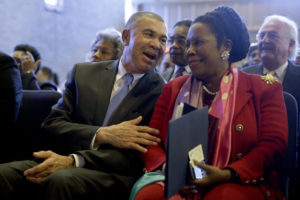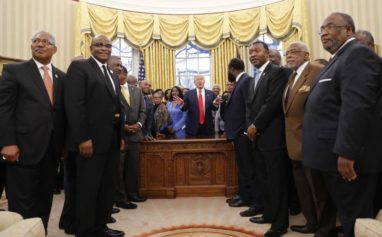The Congressional Black Caucus took a field trip to Ferguson over the weekend, with 11 of the 46 members accepting Missouri Congressman William Lacy Clay’s invitation to speak to local leaders and see up close the community whose name has become a national symbol for racial unrest.
But the staged nature of the event, replete with plenty of photo ops and a lineup of speeches from the pulpit of a local church, illustrated how removed Black leaders can be from the true focus of a community’s anger and disaffection.
They get to hear about the community’s anger, but it’s all second-hand, filtered through interpreters, at least a couple of steps removed from the people who are fighting it and living it on a daily basis. You only get to the real life of the community by walking the streets and interacting with the community without escorts and buffers.
As a result, people feel detached from leadership, removed from the political process, and doubtful that elite political leaders can do anything for them.
“Pursuit of justice for Mike Brown, is not over. It’s not over for Tamir Rice and Eric Garner. We will continue to get justice for those families and not sweep it under the rug,” Clay said at the Wellspring United Methodist Church.
“We are forced to surrender to the reality that our community is disproportionately profiled, followed, detained, arrested, prosecuted, convicted,” said Indiana Congressman Andre Carson.
The new chairman of the caucus, Representative G.K. Butterfield of North Carolina, said the CBC would be using its historically large numbers—the 46 members is the largest caucus in the group’s 44-year history—in Washington to push for change. Butterfield called the national protests in recent months “a turning point in race relations.”
In hip hop there’s this destructive need for authenticity, for artists to prove that they really live the violent, nihilistic world they describe in their music. But politics is an arena where authenticity is actually valuable. It’s not enough for somebody to tell you that the community is hurting. You have to feel it and be immersed in it to truly understand the urgency of now.
It’s a real conundrum for political elites who, over time, begin to spend much more of their days striding through the corridors of power than truly interacting with constituents. Imagine how many layers a message from the streets has to fight through before it reaches the ears of President Obama. Like that game of telephone tag, when a line of kids whisper a sentence in the next person’s ear and giggle when it sounds crazy at the end, it’s bound to sound vastly different when Valerie Jarrett or even Rev. Al Sharpton whispers it in the president’s ear.
The more time leaders spend on Capitol Hill or in the White House, the more removed they get from the pressing issues plaguing the poor, dispossessed and disenfranchised.
They must go on fewer field trips to these communities and spend more time immersed in these communities, without the escorts and buffers. They must walk around by themselves, talk to real people in the grocery store, at the daycare center. Not until you hear and understand the frustrations of the regular kid working at McDonald’s who isn’t applying to college because his family doesn’t have any money, or the young lady not working because she can’t find affordable daycare for her baby, or the young man who is afraid to get a job because the system is waiting to snatch his money for child support, will these leaders understand on an emotional level the crisis among us.
It’s fine for local leaders and community organizers to pass along stories to them about what’s happening in the streets, but they need to make those emotional connections to really push for change. They need to have embedded in their memory bank the look of desperation in that kid’s eyes.
To truly understand the conditions that led up to Ferguson, they need to see how the criminal justice system is raking in revenue and breaking residents with exorbitant fines they must pay when the police create checkpoints to find people driving without insurance, which can even result in them serving jail time. In Staten Island, they need to understand the circumstances that led to Eric Garner—how New York state charges such a high price for a pack of cigarettes to raise revenue on the backs of smokers, forcing the poor to buy the cigarettes individually as “loosies.”
But it is not in the nature of political leadership to delve so deeply into the real pain of their communities. And that is a shame because it leads to a community that believes leaders don’t really care. In fact, that is what leads to a nation whose turnout in the 2014 midterm elections was just 36.4 percent—the lowest in 72 years.


